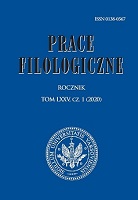Składnia frazeologizmów o funkcjach przymiotnika (zarys problematyki)
The syntax of phraseological units in the adjectival functions (a general overview)
Author(s): Anna PajdzińskaSubject(s): Syntax, Western Slavic Languages, Philology, Phraseology
Published by: Wydział Polonistyki Uniwersytetu Warszawskiego
Keywords: Polish phraseology; semantics; the attributive function;
Summary/Abstract: The article is concerned with phraseological units in the adjectival function (e.g. cały i zdrowy ‘alive and well’, pierwszy lepszy ‘just any’, jaki taki ‘passable, good enough’, starej daty ‘old-school, outdated’, całą gębą ‘through and through’). Attention is also paid to the units that are used both adjectivally and adverbially (e.g. na medal ‘first-class ’, pod adresem ‘at the address’, do białego rana ‘till dawn’, na czarną godzinę ‘for a rainy day’, pi razy oko ‘more or less’). They are analyzed with regard to their internal structure, i.e. relationships between their components, as well as their syntactic behaviour in relation to the rest of the utterance. Internally, both groups of expressions are very diverse. With respect to their function, they can be:– attributive, i.e. standing in relation the noun only: od siedmiu boleści ‘mediocre, pathetic’, spod ciemnej gwiazdy ‘of the deepest dye’, świeżo upieczony ‘new and inexperienced’, z krwi i kości ‘full bloodied’, czystej wody ‘of the first order’;– attributive or complementary (i.e. standing in relation to the noun or the copula), e.g. pod psem ‘rotten; under the weather’, cały w skowronkach ‘happy as a lark’, w czepku urodzony ‘born with a silver spoon in one’s mouth’, nadgryziony zębem czasu ‘time-worn’, zamknięty na cztery spusty ‘locked and bolted’. The latter category can also be used in apposition, as attributive complements, or in relation to the verb.
Journal: Prace Filologiczne
- Issue Year: 75/2020
- Issue No: 1
- Page Range: 385-397
- Page Count: 13
- Language: Polish

